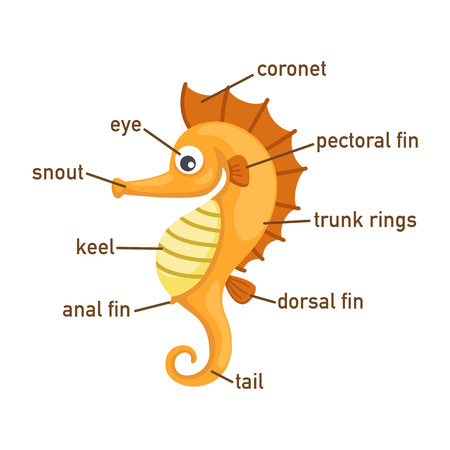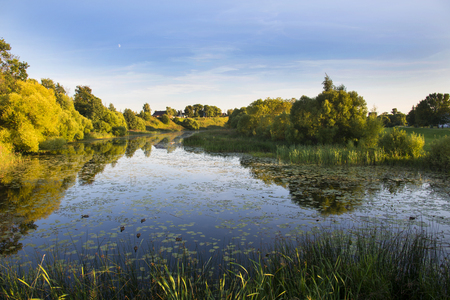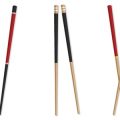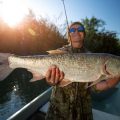Introduction: The Allure of Barbel and Life Beside English Rivers
There’s a particular magic to barbel fishing that’s hard to put into words—something about the gentle mist rolling off the water at dawn, the promise of adventure with every cast, and the age-old rhythm of England’s meandering rivers. For many of us, myself included, it isn’t just about the fish; it’s about embracing the character and calm of riverbank life. Each trip is a journey into the heart of rural Britain, where ancient willows lean over swirling currents and kingfishers dart through dappled sunlight. The barbel itself is legendary among British anglers—renowned for its strength and cunning, earning respect and affection in equal measure. My own fascination began on the banks of the River Trent as a youngster, mesmerised by tales of mighty specimens and the camaraderie of anglers sharing secrets over flasks of tea. These diaries are my invitation to you: step into your wellies, feel the mud between your fingers, and join me as we explore not only how to catch these elusive fish, but why life beside England’s historic rivers is an experience unlike any other.
2. Essential Tackle and Local Know-How
Strolling into a proper English tackle shop is half the fun of barbel fishing—there’s nothing quite like the banter, the whiff of maggots, and the shelves loaded with kit both old-school and cutting-edge. The right gear can make or break your session on the riverbank, so here’s a hands-on guide honed from my own sessions and countless natterings with local anglers over a cuppa.
Gear Up Like a Local
For barbel, you’ll want to aim for robustness without overdoing it. Most locals swear by a 1.75lb–2lb test curve rod paired with a reliable baitrunner reel. Don’t be tempted by flashy imports—British rivers demand practical, tried-and-tested tackle. Here’s a quick comparison I jotted down after an afternoon at Bob’s Tackle & Bait in Oxfordshire:
| Item | Local Favourite | Why It Works |
|---|---|---|
| Rod | Daiwa Black Widow 12ft 1.75lb | Good backbone for hard-fighting barbel, sensitive tip for bite detection. |
| Reel | Shimano Baitrunner 4000D | Smooth drag, classic for feeder work on the Thames or Severn. |
| Mainline | 12lb mono (Korda Touchdown) | Tough enough for snags, subtle enough for wary fish. |
| Hooklink | Korda IQ2 Fluorocarbon 10lb | Virtually invisible, great presentation in clear water. |
| Hooks | Drennan Barbel Specialist #10–#14 | Strong gauge, won’t bend out when a lump takes off. |
Bait Choices: The Proof Is in the Pudding (Or Pellet!)
You’ll hear all sorts at the riverside—one old boy swears blind by luncheon meat cubes, while another lad reckons nothing beats spicy krill pellets or trusty halibut pellets. If you’re after something more traditional, don’t overlook hempseed and caster combos; “the old magic” as locals call it. For those new to British slang: ‘chuck’ means cast, ‘netty’ is your landing net, and ‘mash’ isn’t just potatoes—it’s bread mash for baiting up!
Tackle Shop Chat – Real-Life Tips from the Locals
I once asked Dave behind the counter at Riverbank Angling in Yorkshire what his top tip was for new barbel hunters. He winked and said: “Keep it simple—don’t faff about with gadgets. A sharp hook, tight line and patience will outfish any gizmo.” Another regular piped up: “If you ain’t got a flask of builder’s tea in your rucksack, you’ll not last till dusk!” That’s British wisdom for you.

3. Reading the River: Finding Barbel in English Waters
If there’s one skill that separates the seasoned barbel angler from the hopeful beginner, it’s the ability to read a river. Every waterway across England has its own secrets, and learning to spot those classic barbel haunts is a rite of passage for any serious river angler. In this section of my barbel fishing diaries, I’ll share some hard-won tips and local wisdom on recognising the subtle clues our English rivers offer.
Spotting Likely Barbel Haunts
Barbel love to hold up in areas with steady flow and plenty of cover. Look for deeper runs below riffles, beneath overhanging willows, or beside trailing weed beds—those are often textbook spots where these whiskered beauties lie in wait. Don’t overlook gravel glides at dusk; barbel often move up onto these shallower stretches as light fades, searching for a meal. If you see a stretch with a gentle bend and a good mix of depth and structure, chances are you’re on to something special.
Understanding River Features
It pays to become a student of your local river’s character. Fast, oxygen-rich runs draw barbel during summer months, especially when levels are low. In contrast, after rain or in winter, they’ll tuck themselves into steadier water out of the main push of the flow. Keep an eye out for undercut banks and natural eddies formed by submerged trees or boulders—these often provide perfect sanctuary for barbel to rest between feeding spells.
Recognising Classic British Riverside Signs
The art of barbel fishing in England is as much about soaking up the riverside atmosphere as it is about catching fish. Crushed nettles or flattened grass near the bank can reveal well-trodden paths to productive swims used by generations of anglers—sometimes called “old boys’ pegs.” Watch for swirls or bow waves betraying moving fish at dawn or dusk, and keep your ears peeled for that unmistakable plop of feeding barbel in the margins. A kingfisher darting low across the water or a heron poised nearby are also classic signs that you’re in a stretch teeming with life—and hopefully barbel too.
With each trip to the riverbank, you’ll hone your instincts and sharpen your eyes for these tell-tale signs. Trust me, once you’ve unlocked a few of these secrets, every session becomes an adventure—full of promise and that quintessential British charm only our rivers can offer.
4. On the Bank: Unforgettable Moments and Riverbank Anecdotes
If you’ve ever spent a sunrise or sunset by one of England’s winding rivers, rod in hand and thermos nearby, you’ll know that barbel fishing is never just about the catch. The riverbank becomes a stage for all sorts of adventures—some triumphant, others downright hilarious. Here, I’m sharing a handful of those unforgettable sessions that keep me coming back, rain or shine.
The Session That Nearly Got Away
I’ll never forget the time I hooked what felt like an absolute monster on the Warwickshire Avon. Heart thumping, drag singing, I fought the fish for what seemed an age. But just as my mate was ready with the landing net, the hook pinged out! We both stared at each other—gutted but grinning. It was a near miss, but stories like this are what make barbel fishing so addictive.
Amusing Mishaps on the River
Of course, not every tale is one of heroic battles. There was the infamous incident on the Kennet when my sandwich ended up in the drink (classic rookie error), only for a bold swan to nab it before I could even think about retrieving it! Or the time my mate managed to cast his feeder straight into an overhanging willow—not once, but three times in a row. The banter flowed as freely as the river itself.
Successes to Remember
| River | Memorable Catch | Tactic Used | Session Highlight |
|---|---|---|---|
| River Trent | 13lb Barbel | Pellet and PVA Bag | Dusk run, rod nearly pulled off rest! |
| River Severn | 11lb 6oz Barbel | Caster and Hemp Approach | Screaming take under moonlight |
| Kennet & Avon Canal | 9lb 8oz Barbel | Luncheon Meat Rolling | Battled through thick weed beds |
Anecdotes from Fellow Anglers
No two sessions are ever quite alike, and some of the best tales come from fellow anglers met along the way. From old-timers with tales of record breakers in days gone by to youngsters landing their first barbel on simple maggot rigs, everyone’s got a story worth hearing—and often sharing over a cuppa or at the local tackle shop.
The Magic of English Riversides
Whether it’s watching kingfishers dart above your swim or sharing a laugh as someone’s wellies fill with water during an enthusiastic netting attempt, these moments create memories that last far longer than any single catch. It’s these riverbank experiences—full of camaraderie, surprises, and the odd mishap—that truly define our barbel fishing diaries.
5. The Heart of the Community: Anglers, Camaraderie, and River Traditions
If there’s one thing that sets barbel fishing in England apart, it’s the sense of community you find along the riverbanks. Over the seasons, I’ve come to realise that it’s not just about landing a hard-fighting barbel or perfecting your rig—its also about the people you meet and the traditions you share. There’s a certain camaraderie among anglers here that feels almost timeless. Whether you’re swapping stories at dawn over a flask of tea or lending a spare hook to someone who’s lost theirs in the rushes, these small acts build friendships that can last for years.
Riverbank Etiquette: The Unwritten Code
One thing every seasoned angler learns quickly is the importance of etiquette on the bank. From keeping noise to a minimum so as not to spook the fish (or annoy your neighbour), to always respecting another angler’s swim, these unwritten rules help keep things harmonious. It’s common courtesy to greet fellow anglers with a friendly “alright mate?” and perhaps check how their session is going. Sharing tips—or even bait—goes a long way here, and most old hands are more than happy to help out newcomers, provided they show respect for the water and its inhabitants.
Traditions Passed Down
Barbel fishing in England is steeped in tradition. Many stretches of river have seen generations of families return each year, teaching their children the best spots and secret tactics. There are rituals too: like touching the water for luck before your first cast or gathering at the local pub after a long day to recount tales of ‘the one that got away’. These customs might seem small, but they’re what give English river fishing its special character. They remind us that we’re part of something bigger—a living heritage stretching back centuries.
More Than Just Fishing
For many, time spent on the banks isn’t only about catching fish; it’s about connecting—with nature, with history, and with each other. Some of my fondest memories involve sharing a brew as mist rises from the water, listening to old-timers’ yarns about epic catches or learning how certain swims earned their quirky names. In an age when everything moves so fast, these moments offer a rare chance to slow down and appreciate both the river and the company you keep. Ultimately, it’s this sense of belonging—the shared laughs, lessons learned, and traditions honoured—that makes barbel fishing in England such a cherished pursuit.
6. Lessons Learned and Reflections from the Water’s Edge
If there’s one thing barbel fishing along England’s rivers has taught me, it’s that patience truly is a virtue – not just in angling, but in life itself. Hours spent waiting for that tell-tale twitch on the rod have given me ample time to reflect, observe, and soak in the rhythm of nature. The riverbank becomes a place where worries drift away with the current, replaced by anticipation and quiet hope.
Embracing Patience and Persistence
Barbel are notorious for testing your resolve. You can spend an entire evening watching the mist rise off the water without so much as a nibble. These moments, though sometimes frustrating, teach you to persevere. It’s a gentle reminder that good things often come to those who wait—a lesson as true in everyday life as it is beside the River Trent or Thames.
Connecting with Nature
Sitting quietly among the reeds and willows, I’ve learned to notice the small wonders: kingfishers darting upstream, the faint splash of a water vole, or the distant call of an owl at dusk. Barbel fishing invites you to become part of this landscape, to respect its rhythms and appreciate its beauty. It’s more than just catching fish; it’s about reconnecting with the wild corners of our countryside.
The Joy Is in the Journey
Perhaps my biggest takeaway is that every outing brings its own rewards—even when the barbel aren’t biting. The camaraderie shared with fellow anglers, swapping stories over a flask of tea; the satisfaction of refining your rigs and learning from each cast; and those rare moments when you finally land a hard-fighting barbel—all combine into memories richer than any trophy.
In sharing these diary entries and lessons, my hope is that more people discover the simple joys waiting on England’s riverbanks. Barbel fishing isn’t just about landing a specimen—it’s about embracing patience, respecting nature, and cherishing every step along the way. Tight lines, and may your next adventure by the water be filled with both challenge and wonder.


